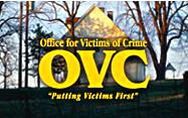Community Partnerships Are Key to Success
Even though prosecutor-based victim/witness programs have gained support for the services they provide, they still face many obstacles to delivering service to victims of crime. For programs that serve low-income, secluded rural areas of the United States, these challenges only intensify. Victims in these areas face the same difficulties as those in larger urban jurisdictions, but the programs designed to help them overcome their trauma and loss must do so with fewer resources and fewer advocates.
Funds for training volunteers and interns can be limited. General trainings for crisis intervention, understanding the court process, or victims' rights and issues, however, can be created with area partnerships. These partnerships may include churches; senior citizen groups; domestic violence shelters; rape crisis centers; schools; hospitals; police, fire, and rescue departments; and others.
All of the successful programs highlighted here have built and relied on partnerships with these and similar organizations to enhance their services. Whether they received people or funding, access to office space or other services, each of the jurisdictions mentioned owes some part of its success to those in other government offices and in the community who were willing to get involved in the effort to better serve victims of crime in rural areas.
To improve these services, the public, prosecutors, and the rest of the criminal justice community must become aware of these challenges and join the fight to overcome them.
|







